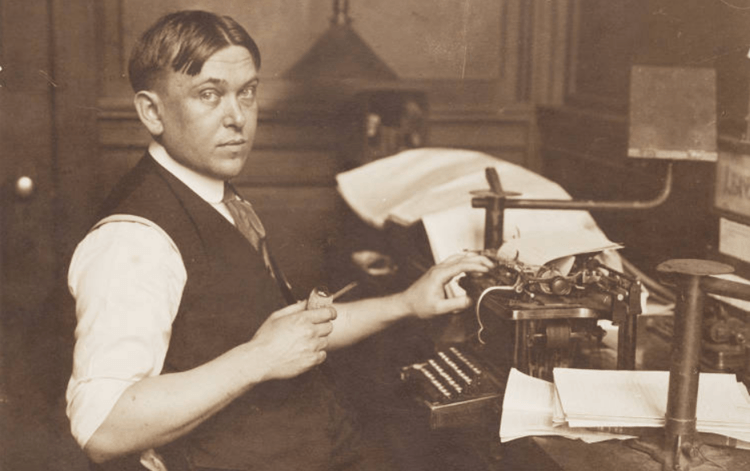
09/18/2013
There are many different theories of what is the underlying essence of humor. A popular one is that what’s funny consists of gentle surprises, of benign violations of expectations.
But I think what you find funny often depends upon what time of the day it is and how tired you are. At four AM, I often find sheer overkill hilarious. Warning: you may not. (Especially if it’s not four AM.)
For my upcoming Taki’s Magazine column, I was reading up on H.L. Mencken. In Modern Times, Paul Johnson writes:
Walter Lippman called [Mencken] "the most powerful influence on this whole [1920s] generation of educated people."
A great part of his appeal lay in his ferocious attacks on Presidents. Theodore Roosevelt was 'blatant, crude, overly confidential, devious, tyrannical, vainglorious and sometimes quite childish." Taft’s characteristic was "native laziness and shiftlessness." Wilson was "the perfect model of the Christian cad," who wished to impose a Cossack despotism." Harding was "a stonehead," Coolidge "petty, sordid and dull … a cheap and trashy fellow … almost devoid of any notion of honor … a dreadful little cad." Hoover had a "natural instinct for low, disingenuous, fraudulent manipulators. …
Mencken excelled himself in attacking [Franklin] Roosevelt, whose whiff of fraudulent collectivism filled him with genuine outrage. He was "the Fuhrer," "the quack," surrounded by "an astounding rabble of impudent nobodies," "a gang of half-educated pedagogues, non-constitutional lawyers," starry-eyed uplifters and other such sorry wizards," and his New Deal "a political racket," "a series of stupendous bogus miracles," with its "constant appeals to class envy and hatred," treating government as "a milch-cow with 125 million teats" and marked by "frequent repudiations of categorical pledges." The only consequence of these diatribes was that Mencken forfeited his influence with anyone under thirty.
Mencken himself was variously described as a polecat, a Prussian, a British toady, a howling hyena, a parasite, a mangy mongerel, an affected ass, an unsavory creature, putrid of soul, a public nuisance, a literary stink-pot, a mountebank, a rantipole, a vain hysteric, an outcast, a literary renegade, and a trained elephant who wrote the gibberish of an imbecile. [Source: Charles Fecher, Mencken: A Study of his Thought, 1979]
Intellectuals, indeed, relished the paranoia of the rich and the conventional, and the extraordinary vehemence and fertility of invention with which [Franklin] Roosevelt was assailed. His next-door neighbor at Hyde Park, Howland Spencer, called him "a frustrated darling," a "swollen-headed nitwit with a Messiah complex and the brain of a boy scout;" to Senator Thomas Schall of Minnesota he was "a weak-minded Louis XIV;" Owen Young, chairman of General Electric, claimed he "babbled to himself," Senator William Borah of Idaho that he spent his time in his study cutting out paper dolls. According to rumor (often surfacing in pamphlets), he was insane, weak-minded, a hopeless drug-addict who burst into hysterical laughter at press conferences, an impostor (the real Roosevelt was in an insane-asylum), under treatment by a psychiatrist disguised as a White House footman, and had to be kept in a straitjacket most of the time. … He was said to be suffering from an Oedipus complex, a "Silver Cord complex," heart trouble, leprosy, syphilis, incontinence, impotency, cancer, comas, and that his polio was inexorably "ascending into his head." He was called a Svengali, a Little Lord Fauntleroy, a simpleton, a modern political Juliet "making love to the people from the White House balcony, a pledge-breaker, a Communist, tyrant, oath-breaker, fascist, socialist, the Demoralizer, the Panderer, the Violator, the Embezzler, petulant, insolent, rash, ruthless, blundering, a sorcerer, an impostor, callow upstart, shallow autocrat, a man who encouraged swearing and "low slang," and a "subjugator of the human spirit."
I guess you could argue that these are now benign violations, since these passions have cooled over the last 80 years. But, as Sam Spade says to Brigid O’shaughnessy in The Maltese Falcon, look how many of them there are. As Stalin liked to point out, quantity has a quality all its own.
At least at 4 A.M.
This is a content archive of VDARE.com, which Letitia James forced off of the Internet using lawfare.